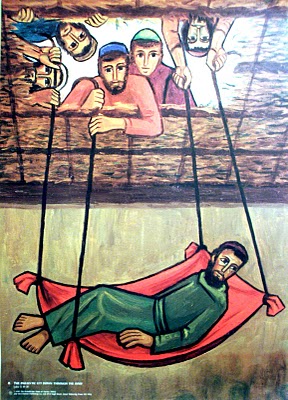This story is not a parable, it is an event;
4 Ιουλίου 2010
Healing of the paralytic
Metropolitan Antony of Sourozh
What has the event related today in the Gospel (St. Matthew IX: l-8) to do with us? Who of us is aware of being paralysed? And who of us has the faith, a calm and yet passionate certainty that no one but God can give us again the freedom of our movements?
This story is not a parable, it is an event; but it also conveys to us something more than the power of God to heal physical sickness if we come to Him with faith; that is having put aside all other hope but knowing for certain that our life and our death, our health and our sickness are in the hand of the Living God Who has chosen to become man in our midst, to share with us everything, including death and pain, including agony of mind and all the horror which may strike us when we look at the surrounding world, the world which we have made and are making.
But there is another aspect in this story to which I want to attract your attention. Who of us can say that he is not paralysed? Paralysed by fear, paralysed by the desire to be seen in the best of lights, paralysed by our calculations that do not allow us to act freely, to breathe freely, to be fearless? How many of us could dare say that they are not possessed of the desire to be seen better than they are, to be seen as they are not, as God does not see us? How many of us could say, «I want to be seen as I am — not only in all my frailty (this, others could accept), but in my deceitfulness, in my ugliness, full of fear, full of vanity», that is, of the desire to be judged on appearances and not on the reality?
And yet, Saint John of the Ladder says that one who is possessed of vanity is arrogant in the face of God while he is a coward in the face of men.
How many of us live continuously measuring our words, calculating our actions, thinking of the result; not only aiming at a good result but afraid of how people will judge us? How afraid we are to look at ourselves and see the truth about our own selves, no longer to look into the distorted mirror that shows us to ourselves and others as beautiful, acceptable, noble, pure — but in another mirror, the mirror of our conscience, the mirror of God’s words and of God’s judgement of which we are aware, but from which we avert our gaze? How many of us, when we catch a glimpse of what we are, do not allow this shaft of light to go beyond a frightened awareness and fall into our hearts to search the darkest corners of it, the deepest corners to which light has not penetrated, which love has never reached, in which the truth has never sounded? How many of us are honest enough to judge themselves, their actions, incipient or fulfilled, in the light of truth?
We are all paralysed: paralysed by fear, paralysed by calculations, paralysed by the determination not to see because we are afraid of what we may see. We still, all of us, imagine that we can live the life of a paralytic and die whole; that we may live a whole life never having faced the truth, and stand before God Who is the Truth — and be acceptable. Oh, it is not a matter of God rejecting us! It is a matter of suddenly discovering, with horror, that we have no place in the realm of Truth, in the realm of daring Truth, in the realm of beauty, of heroic beauty.
Let us reflect on this; let us not think of the man who was paralysed and whose faith healed his body by the power of God; let us think of our own paralysed condition. After one of my last sermons, I was asked by someone, «Why is it that your last sermon was so stern?» I can answer in all honesty: because for months and months I have been searching my own soul, confronting my own conscience, and seeing with horror that I live a lie, that I am not a Christian according to the Gospel, that I stand condemned not only by the Gospel itself, but by what I look like as a Christian. Yes, what I am saying is what I feel about myself; but do you not feel similar things, even if you are infinitely more worthy of God than I am? Do you not feel that, more or less, we all sin in the same way, that we all betray our own self which is called to be a revelation of God, a visible image, a divine presence incarnate in soul, in body, in action and word, in thought and feeling, in intention and result — do we not see that? I do! And what I say is a confession — yes, but a confession which is addressed to all of you: this is what I see in myself — LOOK at yourselves: we still perhaps have time to become true and real as God has willed us, to be what God dreams we should be, to respond to His love by not betraying ourselves, one another and Him.
And there is hope, there is hope because God has the power to heal, God has the power to break our palsy if we turn to Him with faith, and hope and courage! Amen




